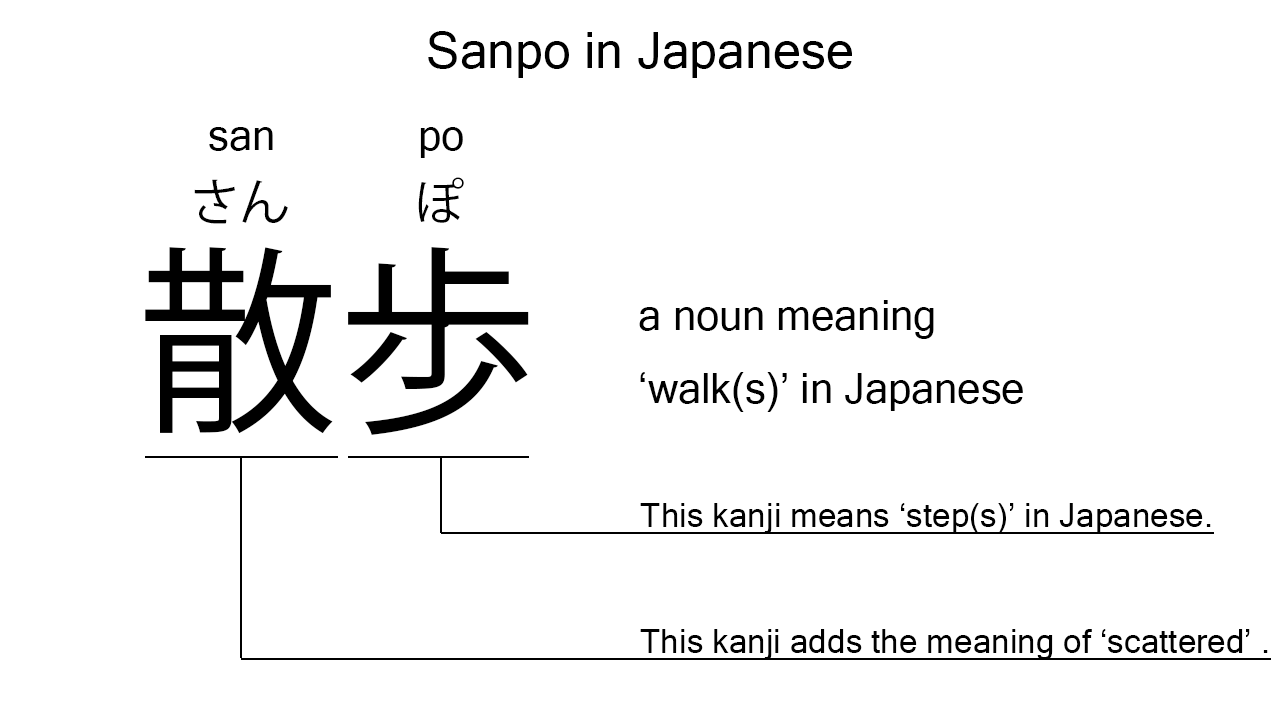What does “sanpo” mean in Japanese?
Native speakers say “sanpo” often to mean a ‘walk’ in Japanese. Perhaps, some Japanese learners know this word as it is sometimes used in Japanese movies, songs, novels, manga, anime, and the like. In this blog post, however, I will explain this word in detail based on its kanji expression. And also, I will explain how to use it through example sentences. My explanations would help Japanese learners understand “sanpo” more clearly. Then, let’s get started!
Contents
Definition and meanings of “sanpo”
Let me start with the definition and meanings of “sanpo”.
- sanpo – 散歩 (さんぽ) : a noun meaning ‘walk’ or ‘stroll’ in Japanese.
The definition and meanings are simple and clear. To understand this noun more clearly, however, let me explain its kanji characters in detail, one by one.
What does “sanpo” literally mean in Japanese?
The kanji expression of “sanpo” consists of the following two kanji characters:
- 散 : a kanji character sometimes used as a prefix to add the meaning of ‘scattered’, ‘diffused’, or such.
- 歩 : a kanji character often used to mean ‘step’. This can also be used to refer to the act of walking.
From these two kanji characters, we can understand that “sanpo” literally means ‘scattered steps’ in Japanese. This literal interpretation is not completely in line with the actual meanings, but still understandable, I think. Walks can consist of scattered steps.

When we meet new kanji expressions, we should check their kanji characters in detail to understand their meanings clearly and deeply. In many cases, kanji characters tell us a lot about the meanings of the expressions they form. Actually, here, we could get the better understanding of “sanpo” through the detailed kanji check above.
So far, I’ve explained the definition and meanings of “sanpo” together with its kanji characters. Then, let me explain how to use it through the example sentences below.
Example #1: how to say “a walk” in Japanese
boku wa tokidoki sanpo ni iki masu – 僕は時々散歩に行きます (ぼくはときどきさんぽにいきます)
I sometimes go for a walk.
Below are the new words used in the example sentence.
- boku – 僕 (ぼく) : a pronoun meaning ‘I’ in Japanese. This is used mainly by boys and young males.
- wa – は : a binding particle working as a case marker or topic marker. In the example, this works after “boku” to make the subject in the sentence.
- tokidoki – 時々 (ときどき) : an adverb of frequency meaning ‘sometimes’ in Japanese.
- ni – に : a case particle used to say what purpose an action is taken for. In the example, this is used after “sanpo” to indicate the purpose for which the speaker goes out.
- iki – 行き (いき) : one conjugation of the verb, “iku“, which means ‘to go’ in Japanese. In the example, it has been conjugated for the better connection with its following word.
- masu – ます : an auxiliary verb used after a verb to make it polite. Probably, this is well known as a part of Japanese masu form. In the example, this is used after “iki” to make it sound polite.
This is a typical usage of “sanpo”. In this example, it works as a part of the commonly-used phrase, “sanpo ni iki masu”, which politely means ‘to go for a walk’ in Japanese.
Example #2: another usage of “sanpo”
watashi mo sanpo ga suki desu – 私も散歩が好きです (わたしもさんぽがすきです)
I like walking, too.
Below are the new words used in the example sentence.
- watashi – 私 (わたし) : a pronoun meaning ‘I’ in Japanese.
- mo – も : a binding particle making the subject word or the object word in a sentence with adding the meaning of ‘too’, ‘also’, or ‘as well’. In this example, this works after “watashi” to make the subject in the sentence with adding the meaning of ‘too’.
- ga – が : a case particle used to make the subject word or the object word in a sentence. In the example, this is used after “sanpo” to make the object in the sentence.
- suki – 好き (すき) : the stem part of the na-adjective, “sukina”, which means ‘favorite’ in Japanese. Native speakers, however, often use this as an individual word to mean ‘to like’ or ‘to love’ in Japanese. In the example, this is used to mean ‘to like’.
- desu – です : an auxiliary verb used after a noun or adjective to make it polite. Probably, this is well known as a part of Japanese desu form. In the example, this is used after “suki” to make it sound polite.
This is another typical usage of “sanpo”. The original meaning of the Japanese sentence is more like ‘I like walks, too’, but it has been translated into English as “I like walking, too.” This sounds much more natural, I think.
Summary
In this blog post, I’ve explained the definition and meanings of “sanpo” in detail based on its kanji expression. And also, I’ve explained how to use it through the example sentences. Let me summarize them as follows.
- sanpo – 散歩 (さんぽ) : a noun meaning ‘walk’ or ‘stroll’ in Japanese. These two kanji characters literally mean ‘scattered steps’ in Japanese. This literal interpretation is not completely in line with the actual meanings, but still understandable. Walks can consist of scattered steps.
Hope my explanations are understandable and helpful for Japanese learners.